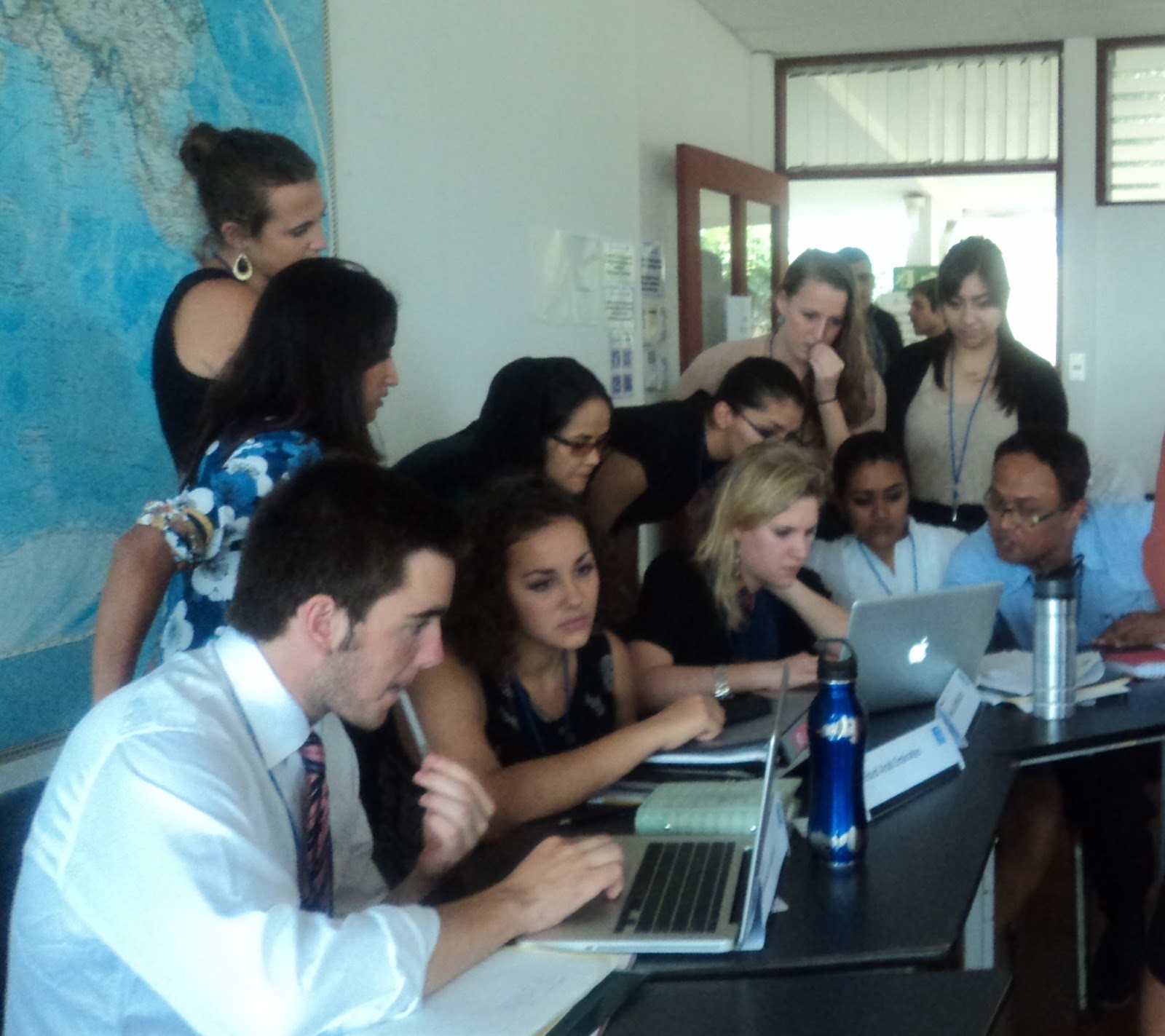
Pace University New York City Model UN Head Delegate Katie James ’14 (seated, third from right, at laptop), as well as Pace students Amanda Orcutt ’13 and Fatima Mustafa ’16 (standing, far right) engage in negotions over the text of their resolution in a simulation of UN Women at the 2013 UN University for Peace Model UN Conference in Costa Rica. Photo courtesy of UPMUNC Media, used with permission.
“The personal is international,” feminist theorist of international relations Cynthia Enloe reminds us. This means that even though global policymaking has traditionally focused on the interactions between states, it is crucial to pay attention to the gender dimensions of international politics.
“This semester, I was enrolled in a feminist theory class, where I learned about the political implications of feminism, which has made me interested in the role of the United Nations in promoting women’s rights,” said Katie James ’14, a political science major, history minor, who was recognized with the award for “Most Diplomatic” delegate for her representation of Switzerland in a simulation of the UN Entity for Gender Equality and the Empowerment of Women (UN Women) at the UN University for Peace Model United Nations Conference at earlier this month.
Katie was one of 13 students from Pace University New York City attending the intensive conference at UPeace’s idyllic campus just outside of San Jose, Costa Rica. The theme of the 2013 conference was “The Path to Peace in an Increasingly Global Society.” Participants, a mix of 150 college, graduate school and high school students, hailed from 49 countries, the most diverse ever UPeace Model UN conference.
“I believe that as a student it is part of my responsibility to encourage and foster a community that promotes peace,” said Katie. “I found the University of Peace and the theme of the conference a gateway to learning more about understanding the importance of a world perspective.”
A head delegate of the Pace University New York City Model United Nations program, Katie, of Farmingdale, Long Island, New York, acts as a leader, co-teacher and mentor to other student participants. She has won multiple awards for her participation in simulations of the UN and other international organizations, including Geneva International Model UN (GIMUN), University of Pennsylvania Model UN (UPMUNC), National Model UN (NMUN) in both New York City and Washington DC and the NMUN specialized conference of Asia-Pacific Economic Cooperation (APEC). Katie has also parlayed this experience into the global policymaking arena in internships with Control Arms, GOAL and Obama for America.
The UPeace conference opened with an address from US Ambassador to Costa Rica, Anne Slaughter Andrew, who told participants that she looked forward to the day that diplomats like her would not be introduced as the “first woman ambassador to Costa Rica.” The Model UN simulation, she said, offered an “great opportunity” to gain experience in “how challenging it is to cross cultures” and the skills for international service.
“To bring the change that is necessary requires courage,” said Ambassador Slaughter Andrew. “You are the generation who asks the question: Are the programs we have the programs we need?”

US Ambassador to Costa Rica, Anne Slaughter Andrew, delivers the keynote address at the UN University for Peace Model UN Conference 2013 Opening Ceremonies. Photo courtesy of UPeace, used with permission.
Two other Pace students participated in the UN Women simulation: Amanda Orcutt ’13 represented Djibouti and Fatima Mustafa ’15, Saudi Arabia. They worked on resolutions calling on the protection of the rights of women and other civilians in conflict.
“The UN Women committee was spectacular! The committee chairs were great and everyone took the topics of discussion seriously, which I appreciated,” said Amanda Orcutt, a psychology and women’s and gender studies double major from North Bend, Washington. “The UN Women committee was a perfect fit for my majors. Being a part of the Model UN Team at Pace this year has been the best decision I have made during my undergraduate career.”
Amanda participated in the University of Pennsylvania Model UN Conference last semester and has a passionate interest in the intersections between gender and development issues. In high school she lived in Lempira, El Zarzal, for two working with Plan International and in her sophomore year at Pace studied for a semester at the University of Dar es Salaam, Tanzania. She is interning with Control Arms this month, assisting their advocacy efforts during ongoing the Arms Trade Treaty negotiations.
“Model UN has intensified my interest in the entire Arms Trade Treaty process, especially given the impact that conventional weapons have on women worldwide,” said Amanda.
Fatima Mustafa has been doing Model UN since high school and was a member of the Pace New York team that were recognized with a “Distinguised Delegation” award at NMUN 2012 and represented Tunisia in a simulation of the Organization of Islamic Cooperation. She has worked with the United Nations Association helping high school and middle school students in Model UN conferences.
“Coming from a country — Pakistan — where women are often deprived of the opportunity to represent themselves in a community, I always keep an interest in women’s issues in hopes to go back to Pakistan and assist women in creating a brighter future,” said Fatima, a political science and American studies major. “This conference gave me the opportunity to expand my knowledge of women’s role in not only the country I was assigned, but others as well.”
Located only two express subway stops from the iconic United Nations complex on the East River, Pace University’s New York City Model UN program has a 60-year history of excellence in regional, national and international conferences. Model UN at Pace is uniquely integrated into the Political Science curriculum within the Dyson College of Arts and Sciences and aims to encourage students to develop wisdom, knowledge, skills and community for global citizenship and vocation.
